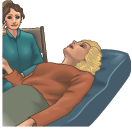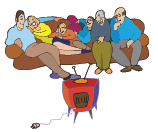|
A Guide To The Cancer Supportive Programs For Patients, Families and Friends
|
Introduction
Back to the Table of Contents
The Cancer Supportive Care Programs (CSCP) provides a team approach to help cancer patients and families improve their quality of life.
The CSCP complements cancer therapy (surgery, radiotherapy, chemotherapy and immunotherapy) by integrating all aspects of healing: strengthening the body, educating the mind, and nurturing hope and courage.
The purpose of the CSCP is to impart knowledge and understanding of problems that patients/families/friends face during diagnosis, treatment and follow-up care by improving quality of life through active and compassionate programs. Our hope is to encourage hospitals and cancer centers to expand their supportive care efforts with programs similar to those used by the Stanford Cancer Supportive Care Program (SCSCP).
Programs and Activities
Back to the Table of Contents
Many different supportive care programs are available depending on the needs of patients and families and the services available at each hospital or cancer center. Programs at the SCSCP include:
- Support Groups
Back to the Table of Contents - The purpose of a cancer support group is to provide
emotional and social support for patients/families and
friends. It provides a place to talk with others experiencing
similar life changes. The groups are lead by a medical social
worker or psychologist and patients may join a group that is
either general or disease specific, such as breast, prostate,
lung or colon.
Support groups help patients get beyond negative coping problems such as confusion, blaming, denial, or helpless/hopeless thoughts, to positive coping activities like planning ahead, constructive thinking, communicating, acceptance and forgiveness. Getting in touch with your feelings is another benefit of group support.
- Nutrition
Back to the Table of Contents -
 Nutrition problems are common among cancer patients and
may affect the success of therapy and survival. A dietitian
will present lectures focusing on ways to minimize side
effects of cancer and/or its treatments.
Nutrition problems are common among cancer patients and
may affect the success of therapy and survival. A dietitian
will present lectures focusing on ways to minimize side
effects of cancer and/or its treatments.
Nutritional information, specific to each patient's needs, will insure a better-nourished patient. Problems addressed include: loss of appetite, anorexia/cachexia, weight loss, and symptoms of fatigue, nausea and pain. -
Exercise
Back to the Table of Contents  Medical literature has documented the benefits of
to improve strength, prevent muscle wasting, shorten
recovery time, and improve prognosis. Exercise
reduce the risk of blood clots and bedsores.
Medical literature has documented the benefits of
to improve strength, prevent muscle wasting, shorten
recovery time, and improve prognosis. Exercise
reduce the risk of blood clots and bedsores.
A physical therapist provides different levels of exercise activity customized for each patient's needs and ability.
-
Chair Massage
Back to the Table of Contents - Massage helps relieve emotional tension through human
contact, relaxing sore muscles to reduce muscle tension and
pain. The various massage motions relax the entire body.
For a patient under stress while waiting in a clinic to be seen
by the doctor, a chair massage will make them feel better
and more relaxed.
A massage specialist can provide chair massages in the clinic or infusion center. - Complementary Medicine (CAM)

-
Restorative Yoga
Back to the Table of Contents -
Restorative yoga is a very gentle, safe and relaxing exercise that provides an effective way to manage stress, relieve pain, and attain peace of mind. Gentle stretching using supported postures and breathing exercises helps bring calmness to the mind and body. Classes are led by a yoga specialist.
-
Medical Qigong
Back to the Table of Contents - The Chinese practice of Qigong (energy skills) utilizes
physical posture, breathing and creative visualization. A number of simple, practical and effective methods are
presented to participants with an emphasis on longevity,
health and self-development. The classes are led by a
Qigong specialist.
-
Feldenkrais
Back to the Table of Contents -
Feldenkrais (Awareness through Motion) classes help
participants become more agile and free in their
movements. Lying on a padded mat, each person moves
at their own pace and ability, using gentle movements.
This activity makes it easier for you to do yoga or
Qigong, to play golf or enjoy a walk, improving your
sense of ease of motion. Classes are led by a Feldenkrais
specialist.
-
Healing/Guided Imagery
Back to the Table of Contents -
 Imagery is a process using the power of your mind to help you heal. You use your own mental images to explore your inner resources while you are in a state of relaxation. The focus of the healing journey may be physical, emotional or spiritual. This self-empowering technique is simple and easy to learn. It can be used for managing pain and/or treatment side effects, such as nausea, and it can help you cope with your illness. Classes are led by a healing/guided imagery specialist.
Imagery is a process using the power of your mind to help you heal. You use your own mental images to explore your inner resources while you are in a state of relaxation. The focus of the healing journey may be physical, emotional or spiritual. This self-empowering technique is simple and easy to learn. It can be used for managing pain and/or treatment side effects, such as nausea, and it can help you cope with your illness. Classes are led by a healing/guided imagery specialist.
-
Fatigue Reduction
Back to the Table of Contents  Fatigue Reduction Workshop
Fatigue is the most common condition affecting cancer
patients. In addition to cancer and cancer therapy, fatigue
symptoms can be caused by anemia, infections,
other illnesses, or age. Generalized tiredness leads to
a major decrease in energy and function in many patients.
Led by a fatigue specialist, the
workshop teaches you how to
balance your energy needs
using energy conserving
techniques. What you learn
here will help you improve
your quality of life and
enjoyment of daily activity
through exercise, improved nutrition, and sleep habits.
Fatigue Reduction Workshop
Fatigue is the most common condition affecting cancer
patients. In addition to cancer and cancer therapy, fatigue
symptoms can be caused by anemia, infections,
other illnesses, or age. Generalized tiredness leads to
a major decrease in energy and function in many patients.
Led by a fatigue specialist, the
workshop teaches you how to
balance your energy needs
using energy conserving
techniques. What you learn
here will help you improve
your quality of life and
enjoyment of daily activity
through exercise, improved nutrition, and sleep habits.-
Managing & Understanding Your Chemotherapy
Workshop
Back to the Table of Contents  Chemotherapy for cancer patients can be
lifesaving. The workshop helps you
understand the potential drug
side-effects of chemotherapy and
teaches you ways to minimize these
problems. The tools offered in this
class can make a major difference in
your experience of chemotherapy, making
it more manageable both physically and
psychologically.
The workshop is led by an oncology nurse
Chemotherapy for cancer patients can be
lifesaving. The workshop helps you
understand the potential drug
side-effects of chemotherapy and
teaches you ways to minimize these
problems. The tools offered in this
class can make a major difference in
your experience of chemotherapy, making
it more manageable both physically and
psychologically.
The workshop is led by an oncology nurse
-
Educational Lectures
Back to the Table of Contents -
 A series of lectures by members of the medical team
provides information about pertinent subjects such as:
A series of lectures by members of the medical team
provides information about pertinent subjects such as:
Coping with Cancer
Insomnia
Fatigue reduction
Chemotherapy side effects and solutions
Pain management
Managing Depression -
Life Tapes Project
Back to the Table of Contents  The Life Tapes Project provides a way to put your life story
on videotape. By recording your family history and
genealogy, important life events, and memories, you will
create a lasting legacy for future generations.
The interview and recording process, usually 1-2 hours
filmed in your own home, promotes family bonding.
A video and DVD tape of
the interview are given
free to you and family
members.
The Life Tapes Project provides a way to put your life story
on videotape. By recording your family history and
genealogy, important life events, and memories, you will
create a lasting legacy for future generations.
The interview and recording process, usually 1-2 hours
filmed in your own home, promotes family bonding.
A video and DVD tape of
the interview are given
free to you and family
members.
-
Art for Recovery
Back to the Table of Contents  Workshops are offered in painting, collage, design, quilting,
writing and poetry. These activities serve both as means for
expressing one's inner thoughts and feelings and
as diversions from the concerns,
fears and problems of everyday
life. The Spirit Art workshop
offers the opportunity to create
altars, mandalas, journals,
meditation beads and other
projects. The classes are led by
an art specialist.
Workshops are offered in painting, collage, design, quilting,
writing and poetry. These activities serve both as means for
expressing one's inner thoughts and feelings and
as diversions from the concerns,
fears and problems of everyday
life. The Spirit Art workshop
offers the opportunity to create
altars, mandalas, journals,
meditation beads and other
projects. The classes are led by
an art specialist.
The music program provides live and recorded music as a means to promote relaxation and recreation. This program is led by a music specialist
- Additional Resources
Back to the Table of Contents
The Cancer Supportive Care website: - www.cancersupportivecare.com provides education, support
and up-to-date information on various aspects of cancer to a
worldwide audience. Articles written by doctors, researchers,
nurses, and patients are included on the website. Examples of
the over 100 topics include Osteoporosis, Post Mastectomy Pain
Syndrome, Mucositis, Lung, Gastrointestinal and Breast
Cancer, Ways of Coping, and Psychological Support.
- Other Websites:
- www.cscp.stanfordhospital.com Stanford website
www.cancerlynx.com Alexandra Andrews webmaster
www.cancer.org The American Cancer Society
www.library.ucsf.edu/db/pubmed The National Cancer Institute's Library of Medicine
www.cim.stanford.edu/healtghlibrary/ Stanford Hospitals and Clinics - Books:
- Everyone's Guide for Cancer Therapy, Dollinger, Rosenbaum,
Tempero, and Mulvihill, Andrews McMeel Publishing, Kansas
City, Missouri
Everyone's Guide to Cancer Supportive Care : A Comprehensive handbook for Patients and Their Families , Rosenbaum and Rosenbaum, Andrews McMeel Publishing, Kansas City, Missouri
Supportive Cancer Care, Rosenbaum and Rosenbaum, Sourcebooks Inc., Naperville, Illinois
Inner Fire: Your Will to Live, Rosenbaum and Rosenbaum, Plexus, Austin, Texas
You're Not Alone, Rosenbaum and Rosenbaum, Photos, Art & Graphics, Sebastapol, CA graphicart@monitor.net -
For More Information
Back to the Table of Contents - Ernest H. Rosenbaum, MD, Director
- Stanford Cancer Supportive Care Programs National/International
Voice: 415-751-0221 Fax: 415-221-6018
Email: erosenbaum@cancersupportivecare.com - Holly Gautier, RN, BSN
- Director, Stanford Cancer Supportive Care Programs
Voice: 650-723-4268 Fax: 650-498-5640
Email: hgautier@stanfordmed.org - Patricia Fobair, LCSW, MPh
- Voice: 650-723-7881 Email: socserv@reyes.stanford.edu
- David Spiegel, MD
- Medical Director, Stanford Center for Integrative Medicine
